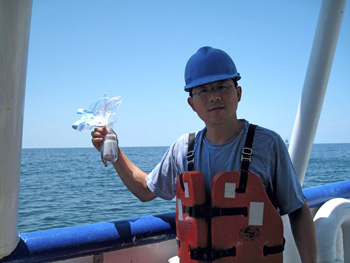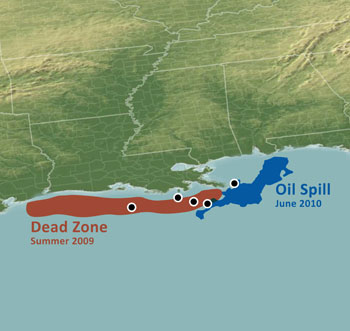Marine scientist Zhanfei Liu is studying the effects of the Deepwater Horizon oil spill on oxygen levels in the northern Gulf of Mexico in part through a recently received National Science Foundation grant for Rapid Response Research (RAPID).
 PORT ARANSAS, Texas—Marine scientist Zhanfei Liu is studying the effects of the Deepwater Horizon oil spill on oxygen levels in the northern Gulf of Mexico in part through a recently received National Science Foundation grant for Rapid Response Research (RAPID).
PORT ARANSAS, Texas—Marine scientist Zhanfei Liu is studying the effects of the Deepwater Horizon oil spill on oxygen levels in the northern Gulf of Mexico in part through a recently received National Science Foundation grant for Rapid Response Research (RAPID).
The $90,000 grant provided additional funding for a research cruise Liu and his colleagues took from May 21-27 to the Gulf of Mexico off the coast of Louisiana.
The scientists are studying marine chemistry in an extensive area of low oxygen (hypoxia) that occurs annually there known as the "Dead Zone." The growing oil spill is likely to encompass this area.
 "We believe that the oil spill will exacerbate the development of hypoxia in the Dead Zone," says Dr. Liu, assistant professor of marine science at The University of Texas at Austin Marine Science Institute.
"We believe that the oil spill will exacerbate the development of hypoxia in the Dead Zone," says Dr. Liu, assistant professor of marine science at The University of Texas at Austin Marine Science Institute.
The Dead Zone has already been of concern for many years, given its detrimental impact on fisheries in the northern Gulf region, such as shrimp. Liu fears the oil spill will only enhance this problem.
"The oil spill is the biggest environmental disaster in the U.S., bigger than the Exxon Valdez," says Liu, "and will have a large economic impact on the region."
Liu and his collaborator Dr. Nathaniel Ostrom from Michigan State University, expect that ocean bacteria will consume oil and in the process consume oxygen, which would lead to greater levels of hypoxia. They also propose that the oil slick on the surface of the Gulf will limit natural gas exchange between the atmosphere and ocean, further reducing the amount of oxygen in the water.
During their recent May cruise, Liu and colleagues sampled the water at six locations in the northern Gulf. One of the sites, near Breton Sound at the mouth of the Mississippi River, has never before been hypoxic, but the scientists were surprised to find it test positive.
"This is probably an indication of the oil spill effect," says Liu, "because the current in that area would bring oil from the spill there. If we find that it is still hypoxic in August, we will be fairly confident that this may be caused by the spill."
Liu will embark on another research cruise with his colleagues in August of this year and again in May 2011. They also hope to sample the ocean this winter.
Liu received $44,612 and Ostrom received $44,758 from the $90,000 RAPID grant.
Their May 2010 cruise was primarily funded by a grant to Dr. Wayne Gardner by the National Oceanic and Atmospheric Association to study nitrogen dynamics in the Dead Zone.
Gardner, Liu, Dr. Peter Thomas and Dr. Ed Buskey are faculty at The University of Texas at Austin Marine Science Institute who have research projects in the area.
To learn about more research at UTMSI that relates to issues such as the Gulf oil spill, visit our Gulf Science Web site.
For more information, contact: Lee Clippard, College of Natural Sciences, 512-232-0675; Dr. Zhanfei Liu, assistant professor, 361-749-6772.

















Comments